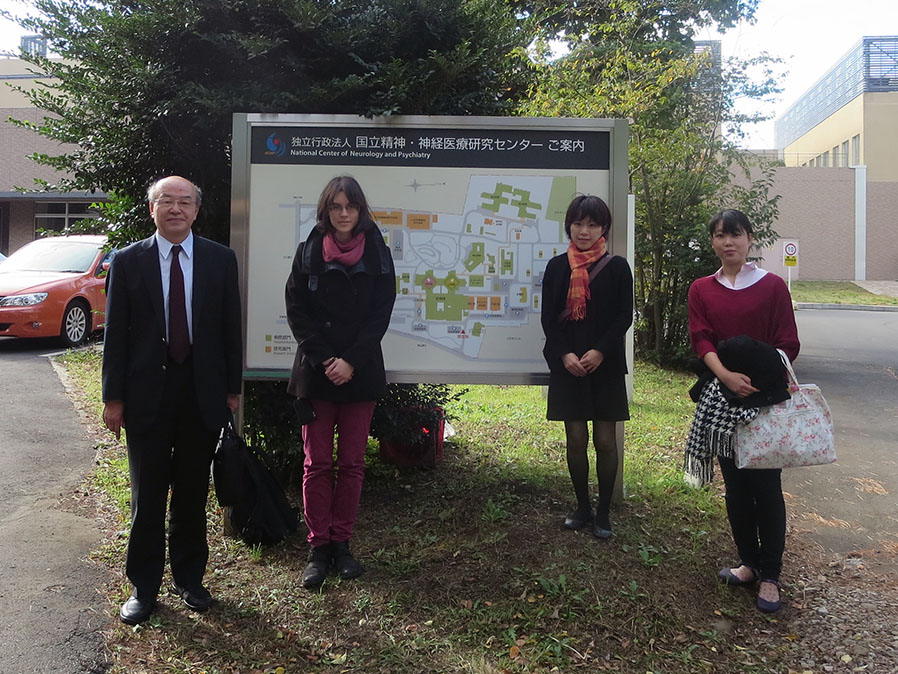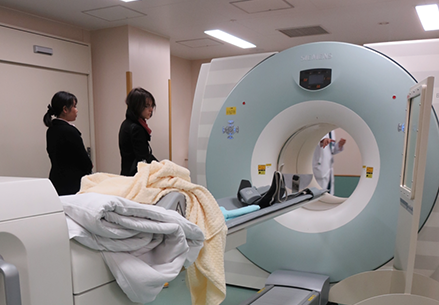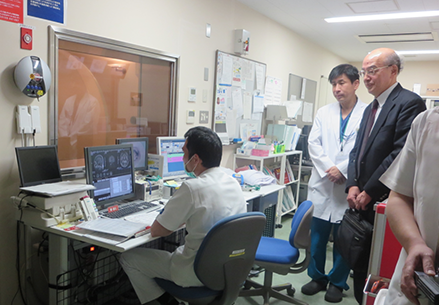Report: Visit to the National Center of Neurology and Psychiatry (NCNP) Josephine Galipon, Chinatsu Hattori
First day
- Time and Date:
- 14:00–16:00, Monday, November 10, 2014
- Venue:
- Integrative Brain Imaging Center, National Center of Neurology and Psychiatry (NCNP)
- Speaker:
- Hiroshi Matsuda, M.D, Ph.D.
- Organized by:
- The Educational Project 3 "Science, Technology, and Inclusive Society," Integrated Human Sciences Program for Cultural Diversity, The University of Tokyo

The National Center of Neurology and Psychiatry is dedicated to the development of diagnostic tools and treatment methods for neurological and psychiatric disorders, in cooperation with scientists, doctors, and patients. Dr. Hiroshi Matsuda is head of the Integrative Brain Imaging Center (IBIC), which performs brain scans by a wide variety of methods while contributing to research. In his lecture, we learned about the technical, ethical, and economic challenges facing accurate diagnosis of cognitive impairment such as Alzheimer's and Parkinson's diseases. By comparing the brains of thousands of patients, they came up with a statistical model that is able to highlight parts of the brain that significantly differ from the general population, increasing the chances of a timely diagnosis. However, things are far from perfect, since the presence of abnormalities on the brain scan does not always correlate with actual cognitive impairment in the patient. We had a lively discussion with Dr. Matsuda about several issues such as the accuracy, financial cost, and psychological impact of diagnosis, as well as the patient's informed consent. We then made a tour of IBIC's facilities, including a machine that functions both as CT-scan and MRI (see picture below).


Second day
- Time and Date:
- 17:00–19:00, Monday, November 17, 2014
- Venue:
- Department of Degenerative Neurological Diseases, National Center of Neurology and Psychiatry (NCNP)
- Speaker:
- Keiji Wada, M.D, Ph.D.
- Organized by:
- The Educational Project 3 "Science, Technology, and Inclusive Society," Integrated Human Sciences Program for Cultural Diversity, The University of Tokyo
Dr. Keiji Wada's research group is dedicated to the elucidation of the molecular mechanisms underlying neurological diseases. Without going into intricate details about molecular pathways, he gave us a very charismatic lecture by which we understood that the brain can and should be studied by a multitude of approaches: philosophy, social sciences, psychology, psychiatry, molecular biology, as well as mathematics. He raised several important challenges, such as the ethical issues regarding the implementation of clinical trials for preventive treatments, given that we are not able to predict for sure whether a given person may or may not develop the disease. Another interesting point was the especially strong effect of placebo in the case of brain-related symptoms. The audience was composed of people from a wide variety of backgrounds: IHS students and staff from philosophy, social sciences, and biological sciences, but also medical and graduate students involved in research at NCNP (see picture below: Dr. Wada's laboratory members). All together, we had a very lively and insightful discussion with Prof. Wada, who gracefully offered his opinion on a variety of topics.
We are very grateful for this opportunity to interact with doctors and scientists involved in clinical researc
